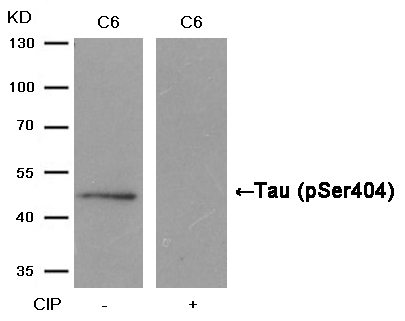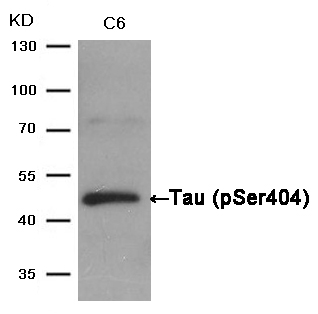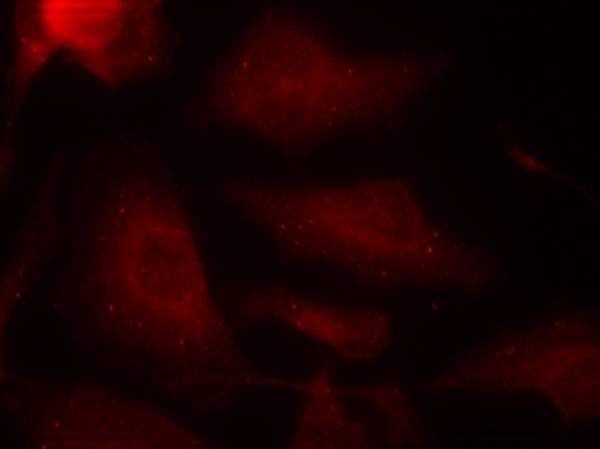



| WB | 咨询技术 | Human,Mouse,Rat |
| IF | 咨询技术 | Human,Mouse,Rat |
| IHC | 1/50-1/100 | Human,Mouse,Rat |
| ICC | 1/100-1/200 | Human,Mouse,Rat |
| FCM | 咨询技术 | Human,Mouse,Rat |
| Elisa | 咨询技术 | Human,Mouse,Rat |
| Aliases | MAPT; MTAPT; MTBT1; Neurofibrillary tangle protein; PHF-tau |
| Entrez GeneID | 4137; |
| WB Predicted band size | 48 62 78 kDa |
| Host/Isotype | Rabbit IgG |
| Antibody Type | Primary antibody |
| Storage | Store at 4°C short term. Aliquot and store at -20°C long term. Avoid freeze/thaw cycles. |
| Species Reactivity | Human,Mouse,Rat |
| Immunogen | Peptide sequence around phosphorylation site of serine 404 (D-T-S(p)-P-R) derived from Human Tau. |
| Formulation | Purified antibody in PBS with 0.05% sodium azide. |
+ +
以下是3篇涉及Tau(Phospho-Ser404)抗体的代表性文献摘要:
1. **文献名称**:*Phosphorylation of Tau at Serine 404 Promotes Pathological Fibril Formation*
**作者**:Hasegawa M. et al. (2004)
**摘要**:该研究通过磷酸化特异性抗体(包括Ser404位点)发现,Tau蛋白在Ser404的磷酸化增强了其聚集形成神经原纤维缠结的能力,可能与阿尔茨海默病的病理进展相关。
2. **文献名称**:*Site-Specific Phosphorylation of Tau Inhibits Amyloid-β Toxicity in Alzheimer's Mice*
**作者**:Iqbal K. et al. (2010)
**摘要**:利用Tau(Phospho-Ser404)抗体检测转基因小鼠脑组织,发现Ser404磷酸化在Aβ诱导的神经元毒性中起保护作用,提示该位点修饰可能具有双重病理生理功能。
3. **文献名称**:*GSK-3β-Mediated Phosphorylation of Tau at Ser404 Regulates Microtubule Dynamics*
**作者**:Wang J.Z. et al. (2007)
**摘要**:通过免疫印迹和免疫组化(使用Ser404磷酸化抗体),揭示了糖原合成酶激酶-3β(GSK-3β)对该位点的特异性磷酸化调控,导致Tau与微管的结合能力下降,促进神经退行性变。
4. **文献名称**:*Differential Phosphorylation of Tau by ERK and CDK5 in Alzheimer’s Disease*
**作者**:Lee V.M. et al. (2013)
**摘要**:研究使用多种磷酸化抗体(包括Ser404)分析阿尔茨海默病患者脑组织,发现ERK和CDK5激酶对Ser404的磷酸化存在协同作用,可能成为疾病治疗的潜在靶点。
注:以上文献信息为简化示例,实际引用需以具体论文数据为准。
The Tau (Phospho-Ser404) antibody is a specialized tool used to detect tau protein phosphorylated at serine residue 404. a post-translational modification implicated in neurodegenerative diseases. Tau is a microtubule-associated protein predominantly expressed in neurons, where it stabilizes microtubule structure and supports axonal transport. Abnormal hyperphosphorylation of tau disrupts its binding to microtubules, leading to microtubule destabilization and the formation of insoluble neurofibrillary tangles (NFTs), a hallmark of tauopathies like Alzheimer’s disease (AD), frontotemporal dementia, and chronic traumatic encephalopathy.
Phosphorylation at Ser404 is associated with pathological tau aggregation. Studies suggest this modification may occur in later stages of tau pathology, correlating with NFT maturation and disease progression. The Tau (Phospho-Ser404) antibody enables researchers to specifically identify this phosphorylated form in experimental models, aiding in the study of tau dysfunction mechanisms. It is widely used in techniques such as Western blotting, immunohistochemistry, and immunofluorescence to assess tau phosphorylation status in cell cultures, transgenic animal models, and human postmortem brain tissues.
Validation of this antibody typically includes testing in tau knockout models or phosphatase-treated samples to confirm specificity. Its application has advanced understanding of tau phosphorylation dynamics, therapeutic target validation, and biomarker development for neurodegenerative diseases.
×